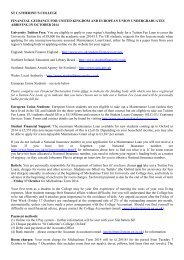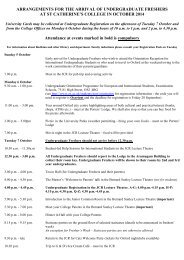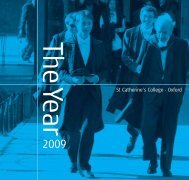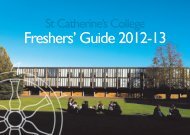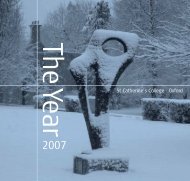Download PDF - St. Catherine's College
Download PDF - St. Catherine's College
Download PDF - St. Catherine's College
- No tags were found...
You also want an ePaper? Increase the reach of your titles
YUMPU automatically turns print PDFs into web optimized ePapers that Google loves.
CATZ FELLOWSDan HoweEmeritus Professor of American History, winner ofthe 2008 Pulitzer Prize in HistoryTaking 900pages to coverthirty-threeyears of thehistory of onecountry doesseem rathergenerous ...One morning last April I went off to give a lecture andcame home to find my answerphone full of messages.They turned out to be from friends congratulating me onhaving won the Pulitzer Prize in History. After listeningto them, I thought, ‘Can I believe this? I haven’t heardanything from the Pulitzer people themselves.’ So I askedmy editor at Oxford University Press, New York. She replied,‘Oh, yes, it’s true. They don’t notify the winners directly;they hold a press conference and post the outcome ontheir web site.’ And so it proved. In June, my wife and Iattended an award ceremony at Columbia University in NewYork. And in July the Master hosted a delightful reception in<strong>College</strong> to celebrate the prize with other Fellows.The Pulitzer Prizes are awarded annually: several forjournalism and six of them for books (fiction, non-fiction,poetry, drama, biography, and history). Mine came forWhat Hath God Wrought: The Transformation of America,1815-1848, a volume in The Oxford History of the United<strong>St</strong>ates series.A fat book, What Hath God Wrought is aimed (like theothers in its series) at both an academic audience and thegeneral literate public. Taking 900 pages to cover thirtythreeyears of the history of one country does seem rathergenerous, but I plead in extenuation that I cover manydifferent kinds of history: social, political, economic andintellectual. The history of literature, law, drama, and musicall appear. The title comes from the message sent bySamuel F B Morse to demonstrate his new electric telegraphin 1844, though it also illustrates the importance of biblicalreligion and, in a larger sense, the providential sense oftheir country’s destiny held by many Americans at thetime. Innovations in transport (the first locomotive in theUnited <strong>St</strong>ates was imported from England in 1828) andcommunications (the telegraph was invented independentlyin Britain by Charles Wheatstone) integrated a vast nationthat expanded to California during these years. Reformmovements, like technology and commerce, crossed theAtlantic: antislavery was particularly momentous, butonly one aspect of a ‘benevolent empire’ of internationalreligious philanthropy. A war at the beginning of the story(with Britain) and at the end (with Mexico) allow me totreat military history.My next project (God willing) will be a history of the warbetween the United <strong>St</strong>ates and Mexico that will treat bothsides of that all-too-neglected story.ST CATHERINE’S COLLEGE 2008/55




